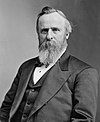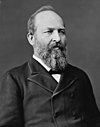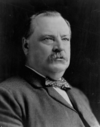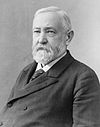The majority of presidents of the United States have been clean-shaven, including the Founding Fathers. [1] Between 1861 and 1913, all but two presidents ( Andrew Johnson and William McKinley) wore either beards or mustaches during their tenure in office. Since 1913 all presidents have been clean-shaven except for Harry Truman for a brief period of time in 1948.
Overview
John Quincy Adams (1825–1829) was the first U.S. president to have notable facial hair, with long sideburns. [2] But the first major departure from the tradition of clean-shaven chief executives was Abraham Lincoln (1861–1865), [3] [4] [5] who was supposedly (and famously) influenced by a letter received from an eleven-year-old girl named Grace Bedell, to start growing a beard to improve his chances of being elected. [6] [7] After Lincoln, all but two presidents over the next 48 years sported some form of facial hair; the exceptions being Andrew Johnson (1865–1869) and William McKinley (1897–1901). [8]
Beards and mustaches fell out of favor due to health reasons, as described on the PBS website pertaining to a documentary on tuberculosis: "Most men at the turn of the [twentieth] century featured stylish beards or mustaches, but showing off a smooth face became a new trend once public health officials maintained that men could transmit dangerous infectious particles through the scruff of their facial hair. An editorial in a 1903 Harper's Weekly stated, "Now that consumption is no longer consumption, but tuberculosis, and is not hereditary but infectious…the theory of science is that the beard is infected with the germs of tuberculosis." Ultimately, the clean-shaven look became a symbol of the new middle-class man during the period that Harper's Weekly labeled "the revolt against the whisker." [9]
The most recent president to have had facial hair was William Howard Taft (1909–1913). [10] [11] [12] [13] [14] President Harry Truman briefly grew a mustache and goatee (which he jokingly referred to as a " Jeff Davis") while vacationing in Key West, Florida, after the 1948 presidential election. [15]
The last major candidate from any party to have a beard was Charles Evans Hughes, who was defeated at the 1916 presidential election. [16] The last major party candidate for the presidency to have any facial hair was Thomas E. Dewey, who had a mustache, and was defeated at both the 1944 and 1948 presidential elections. [17] [18] Some pundits even claimed that public disapproval of Dewey's mustache may have contributed to his two electoral defeats. [19] [20] [21] [22]
Social scientists have researched the effect of facial hair on the electability of presidential candidates, and currently consider facial hair to have a negative effect on candidates. [11] [23] [24] Today, the existence of facial hair on potential presidential candidates is regularly noted (albeit somewhat jokingly) as a harmful factor. [25] [26]
Following is a list of American presidents who had facial hair at any time during their tenure. [27]
List
| No. | Portrait | Name (birth–death) |
Years served |
Political party |
Beard | Mustache | Sideburns | Time period | Color |
|---|---|---|---|---|---|---|---|---|---|
| 6 |

|
John Quincy Adams (1767–1848) |
1825–1829 | Democratic-Republican / National Republican | 1811 | Light brown, [28] turned white before elected [29] | |||
| 8 |

|
Martin Van Buren (1782–1862) |
1837–1841 | Democratic | 1807 | White, originally red or reddish-blond [30] [31] | |||
| 12 |

|
Zachary Taylor (1784–1850) |
1849–1850 | Whig | 1815 | Gray | |||
| 16 |

|
Abraham Lincoln (1809–1865) |
1861–1865 | Republican / National Union | — | 1860 | Black [32] | ||
| 18 |

|
Ulysses S. Grant (1822–1885) |
1869–1877 | Republican | — | 1852 | Light brown, [33] turned grey in office [34] | ||
| 19 |

|
Rutherford B. Hayes (1822–1893) |
1877–1881 | Republican | — | 1854 | Blond [31] | ||
| 20 |

|
James A. Garfield (1831–1881) |
1881-1881 | Republican | — | 1850 | Light brown | ||
| 21 |

|
Chester A. Arthur (1829–1886) |
1881-1885 | Republican | 1847 | Brown [35] | |||
| 22/24 |

|
Grover Cleveland (1837–1908) |
1885–1889; 1893-1897 |
Democratic | 1859 | Brown | |||
| 23 |

|
Benjamin Harrison (1833–1901) |
1889–1893 | Republican | — | 1849 | Blond [31] [36] | ||
| 26 |

|
Theodore Roosevelt (1858–1919) |
1901–1909 | Republican | 1880 | Red [37] | |||
| 27 |

|
William Howard Taft (1857–1930) |
1909–1913 | Republican | 1880s | White [38] | |||
| 33 |

|
Harry S. Truman (1884–1972) |
1945–1953 | Democratic | 1948 | Gray |
Notes
References
- ^ Hoogenboom, Ari. What Really Caused The Civil War?, Wisconsin Magazine of History (1960) ("The founding fathers were without beards, as were all Presidents from Washington to Buchanan.")
- ^ Most Presidents Have Favored Beardless Look, Star-Banner ( Associated Press), August 27, 1986
- ^ Brus, Michael. Beards, Slate (magazine), August 9, 2001
- ^ Whiskers in History, Chicago Tribune, May 27, 1888 ("Thirty Years Ago a Bearded Man in the United States Was an Exception – The Fathers of the Republic Were Smooth Shaven – All Republican Candidates and Presidents Have Worn Full Beards, While No Democrat Has Yet Been Able to Display More than a Mustache")
- ^ Presidential Whiskers, Atlanta Constitution, January 7, 1892
- ^ Kansas Honors Girl Who Urged Lincoln To Grow Whiskers, The New York Times, August 9, 1966
- ^ Shapiro, Ben. Project President: Bad Hair and Botox on the Road to the White House, ch. 6 (2008) ( ISBN 978-1595551009)
- ^ Best presidential criterion: Hair, USA Today, October 10, 1996
- ^ "General Article: Did You Know?". American Experience. PBS.
- ^ Paxson, Peyton, Media literacy: thinking critically about visual culture, p.91 (2004)( ISBN 978-0825149917)
- ^ a b Herrick, Rebekah, Mendez, Jeanette and Pryor, Ben, Razors Edge: The Politics of Facial Hair (2010). APSA 2010 Annual Meeting Paper ("Although between Lincoln and Taft all but two presidents had facial hair, Pres. Taft was the last President to have facial hair. In Congress, at the beginning of the 110th Congress less than 5% of Congressmen had facial hair. Interestingly this decline occurred as women got the right to vote. This paper explores whether there could be a connection.")
- ^ About Whiskers, Los Angeles Times, June 18, 1916 ("The fact that Presidential Candidate Hughes, and his running mate on the Republican ticket, Mr. Fairbanks, have whiskers has been much commented on the last day or two, and will be likely to cause much...")
- ^ Whiskers and Presidency: Kern The Only Democratic Aspirant Who Wears Full Beard, The Baltimore Sun, January 25, 1912
- ^ Locke, Walter. Time for a Turn in the Whisker Cycle, The Miami News, March 1, 1949
- ^ LIFE November 22, 1948
- ^ Will campaign be decided by a close shave?, The San Diego Union-Tribune, September 23, 2004
- ^ Facial Hair Unacceptable for Presidential Politics, Reading Eagle ( Knight Ridder), November 2, 1996
- ^ Efron, Edith. Saga of the Mustache, The New York Times, August 20, 1944
- ^ Grimsley, Edward. Victory is under the candidate's nose, Richmond Times-Dispatch, November 15, 1991 ("Pundits attributed Dewey's defeats partly to public disapproval of his mustache.")
- ^ Montgomery, M.R. Dewey's Facial Flaw, The Boston Globe, November 7, 1986 ("Thomas E. Dewey had a mustache, which was one of the reasons he did not get elected president.")
- ^ A Beard for Nixon? The Matter Raises White House Eyebrows, Los Angeles Times, April 29, 1971
- ^ Olin, Dirk. In Politics, the Mustache Is the Kiss of Death, Los Angeles Times, October 31, 1988
- ^ Armstrong, J. Scott & Graefe, Andreas. Predicting Elections from Biographical Information About Candidates: A Test of the Index Method (March 1, 2010). Journal of Business Research (Forthcoming) ("Given that most politicians, especially in recent years (note that William Taft was the last U.S. president with facial hair), are clean shaved, facial hair is expected to have a negative effect on the evaluation of candidates.")
- ^ Whiskers in Politics, The Boston Globe, May 22, 1896 ("An enterprising student of politics has been pursuing a line of research designed to show the relation of whiskers to successful presidential candidacies.")
- ^ John Bolton Threatens to Run for President If You Don’t Start Paying Attention to Him, New York (magazine), August 30, 2010 ("The last man with facial hair to be elected president was William Howard Taft, in 1908. That in itself should disqualify John Bolton and his enormous, walruslike mustache from even thinking about running in 2012.")
- ^ Buchwald, Art. Race or Facial Hair?, Southeast Missourian, April 9, 1984 (satirical article noting Jesse Jackson's mustache as a negative factor in the 1984 Democratic primary contests)
- ^ Allan D. Peterkin (2001), One thousand beards: a cultural history of facial hair, Arsenal pulp press, pp. 36–37, ISBN 9781551521077
- ^ Nowlan, Robert A. (10 January 2014). The American Presidents, Washington to Tyler: What They Did, What They Said, What Was Said About Them, with Full Source Notes. Jefferson, N.C.: McFarland. ISBN 978-1-4766-0118-2. "In such bitter cold of winter, the pink of his round, clean-shaven, very English face would all but glow, and if he were hatless or without a wig, his high forehead and thinning hairline made the whole of the face look rounder still. The hair, light brown in color, was full about the ears."
- ^ Richards, Leonard L. (1986). The Life and Times of Congressman John Quincy Adams. Oxford University Press. p. 3. ISBN 978-0-19-504026-5. "He was a small man, about five foot seven, with a slight pot belly, a round face, and a bald head surrounded by a crown of white hair and white sideburn"
- ^ Wilson, Major L. (1984). The Presidency of Martin Van Buren. University Press of Kansas. p. 22. ISBN 978-0-7006-0238-4. "...framed by a prominent brow and sandy red sideburns that were now mostly gray, gained its particular feature from big blue penetrating eyes..."
- ^ a b c "Blond on Blonde". Washington Examiner. 20 May 2016. "Martin Van Buren was noted for his reddish-blond hair, though it had turned white and largely receded by the time he was elected our eighth president. It would be another 36 years before another blond took the oath of office: Rutherford B. Hayes in 1877. Following him would come Benjamin Harrison, of golden hair and beard, elected a mere 12 years later. (This really was America's gilded age.)"
- ^ Monaghan, Jay (1 January 1997). Abraham Lincoln Deals with Foreign Affairs: A Diplomat in Carpet Slippers. University of Nebraska Press. p. 49. ISBN 978-0-8032-8231-5.
- ^ Simpson, Brooks D. (21 October 2014). Ulysses S. Grant: Triumph over Adversity, 1822–1865. Quarto Publishing Group USA. p. 259. ISBN 978-1-62788-546-1. "He is rather under middle height, with a spare, strong build; light-brown hair, and short, light brown beard"
- ^ Flood, Charles Bracelen (11 October 2011). Grant's Final Victory: Ulysses S. Grant's Heroic Last Year. Hachette+ORM. p. 48. ISBN 978-0-306-82056-4. "And here the two of them were, Grant now with a grey beard..."
- ^ "Picture of Chester Arthur ***". www.presidential-power.org.
- ^ Bailey Amer Pageant Vol 2. D. C. Heath. 1975. ISBN 978-0-669-92940-9. "He urged as a compromise choice Benjamin Harrison of Indiana, whom the convention finally nominated. Harrison, with his stumpy legs, short neck, and long blond beard, was not an impressive figure (five feet six)..."
- ^ "Urban Woodsman: Theodore Roosevelt and his Buckskin Suit". MCNY Blog: New York Stories. 4 November 2014. "a short red mustache and eye glasses, [who] looks the typical New York dude” [5]."
- ^ "Facial Hair Friday: Opening Day Mustache". Pieces of History. 29 March 2013. "Taft is the newest addition to the Nationals Racing Presidents.The 27th President is well-known for his size and his bushy white mustache. He was the last President to sport facial hair while in office."
External links
- Heads of State (February 14, 2010 New York Times graphic of all presidential hairstyles including facial hair)